Who we are and what we do
We assess and provide rehabilitation for hearing loss and tinnitus. Our services cover all Lothian areas.
We have specialist clinics for people who have dementia and for Adults with Learning Disabilities. We can assess hearing if people are able to tolerate wearing headphones and are able to make a response of any kind when they hear a sound.
We have a limited Domiciliary visit service for people who are unable to attend any Outpatient appointments.
Rehabilitation for hearing loss is usually by issue of hearing aids but we can also provide alternative listeners. Council-funded services also provide equipment such as TV listeners on loan to people who have been assessed as being deaf or hard of hearing, and can give advice on other support available.
Rehabilitation for tinnitus is by helping people hear better using hearing aids, by providing sound generators and by counselling and advice.
Always Be Sensory Aware
Always ask about hearing and vision and usual means of communication – if the person themselves cannot tell you then please ask their relatives or most recent Care Provider.
Hearing Loss
How common is hearing loss?
At least 75% of care home residents will have some degree of hearing loss. The most common cause is presbyacusis – the loss of hearing for high pitched sounds due to ageing.
People can hear speech but have trouble with clarity as they can’t hear consonants such as ‘f’, ‘s’, ‘th’, ‘c/k’ – so words such as ‘sat’, ‘that’, ‘cat’ would all sound the same. As presbyacusis worsens, they start missing more consonants and then have trouble hearing speech at all.
Why is hearing loss important?
Hearing is vital for residents to know what is happening around them, especially when people or things are out of sight. Therefore, untreated hearing loss can affect communication during patient care and lead to social isolation and depression. Hearing loss can also cause frustration and irritation due to communication breakdown.
What does hearing loss sound like?
The short clip below tries to demonstrate how presbyacusis sounds – the chart on the video shows the level of hearing loss which changes from mild to moderate to severe.
BUT to know how each resident hears, they need a full hearing test – please see the Audiology referral page for more information on referral
What else can cause hearing loss?
Ear wax impaction can make hearing much worse, as many as 1 in 3 care home residents are affected. Furthermore, untreated ear infections can also cause hearing loss and discomfort.
What are the signs of hearing loss?
- Not being aware of loud noises
- Turning up the TV volume very high
- Needing to have things repeated
- Withdrawal from activities
- Struggling to hear on the phone
There is no such thing as ‘selective hearing’ – only times when people can no longer compensate for their hearing loss
Vision is also important – we all lipread without realising it. People with severe hearing losses rely on lipreading. Sight loss or speakers wearing masks makes understanding speech more difficult.
Hearing Loss and Dementia
What if a resident has dementia?
Hearing loss is more common among people with dementia.
They may:
- Be less aware of problems and be less able to ask for help
- Have used hearing aids in the past but stopped using them or lost them as dementia develops, especially if they have limited family or social support
- Be more sensitive to loud noises in their environment
View the Dementia and Sensory Challenges video below for more information
What are the signs of hearing loss in residents who have dementia?
If residents who have dementia aren’t able to communicate or are not aware of their environment, how do you know if the problems are due to hearing loss or due to dementia?
Both will probably be important, but hearing can be improved by using aids or other assistive devices.
What can help:
- Check ears for impacted wax
- Find out how they usually communication
- Find out if they have worn hearing aids in the past and replace lost aids by referral to Audiology or a private hearing aid dispenser
- Try a personal listener (see photo) – a small amplifier for mild to severe hearing losses. The volume and tone of these can be adjusted for each user
- Try a smartphone amplification app
- Apps to assist with hearing loss see the Hearing Link Services website for more information
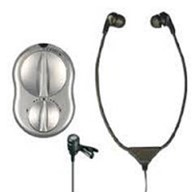
If communication or awareness improves when sound is amplified, please consider referring to Audiology, – please see the Audiology referral page for more information on referral. Ideally, all people with dementia should have their hearing and vision tested.
If communication remains difficult, please contact Speech and Language Therapy. Please see the Speech and Language Therapy page for more information.
How does Sensory Impairment impact the care of residents with dementia?
The Social Care Institute for Excellence (SCIE) highlight the importance of making adjustments to compensate for both vision impairment and hearing loss.
Please see the SCIE website for Hearing Loss and Dementia: Advice for Care Staff
View the Dementia and Sensory Loss video below
Tinnitus
Tinnitus is the perception of noises when there is no outside source of sounds and is common among people with hearing loss.
The type of sounds heard include
- Simple buzzing, hissing or ringing sounds
- Unclear speech
- Music which may be repetitive and sound so real that people believe it is an actual band or radio playing. Sometimes it might be enjoyable but it can become distressing
People with dementia may not be able to make sense of these sounds and may seek for a source.
Aiding hearing may help lessen the severity of tinnitus. Sound therapy may also help, for more information please see the website British Tinnitus Association: Tinnitus and Sound Therapy
Dizziness
Residents with dizziness should see their GP so they can be referred to an appropriate service.
The balance organs in the ears work best when Vitamin D levels are within recommended limits. Please identify residents who are Vitamin D deficient and consider supplementation.
What are the options for rehabilitation of hearing loss?
1. Record hearing and vision status so that staff can adapt communication
2. Use hearing aids
3. Use assistive devices TV listeners, amplified phones or personal listeners
4. Controlling the listening environments by reducing unnecessary noise and including more surfaces to dampen reverberation and by reducing the distance between speaker and listener to less than 1 metre
5. Provide positive listening experiences such as meaningful communication and access to the sounds of nature and music
Hearing Aids
What are the different types of hearing aids used?
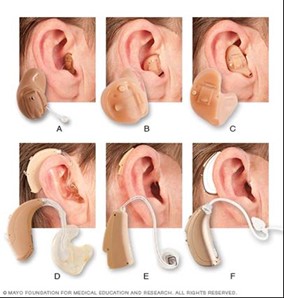
Hearing aids can be grouped into ‘Behind the Ear’ aids and ‘In the Ear’ aids. NHS Hearing aids are ‘Behind the Ear models’.
Most hearing aids work by amplifying sound picked up via a microphone . Amplification is powered by a disposable battery or by an internal battery that needs to be charged daily. Louder sound is delivered into the ear.
Specialist Hearing aids include Bone-Anchored Hearing Aid and middle ear implants and Cochlear Implants which are Issued by Scottish Cochlear Implant Programme at Crosshouse Hospital or privately.
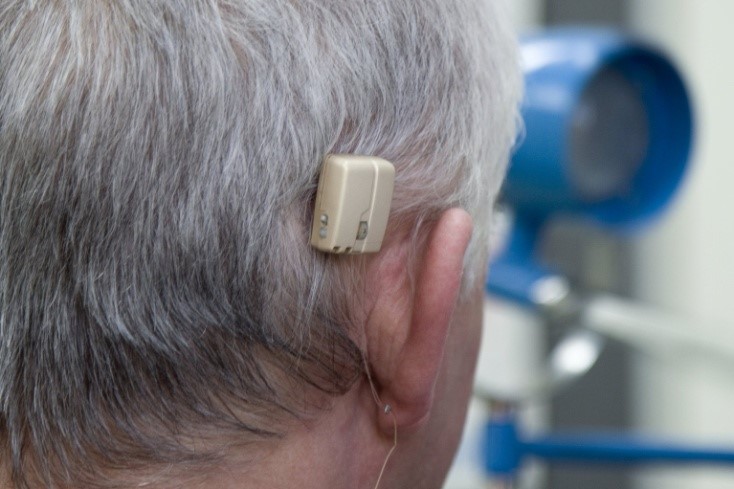
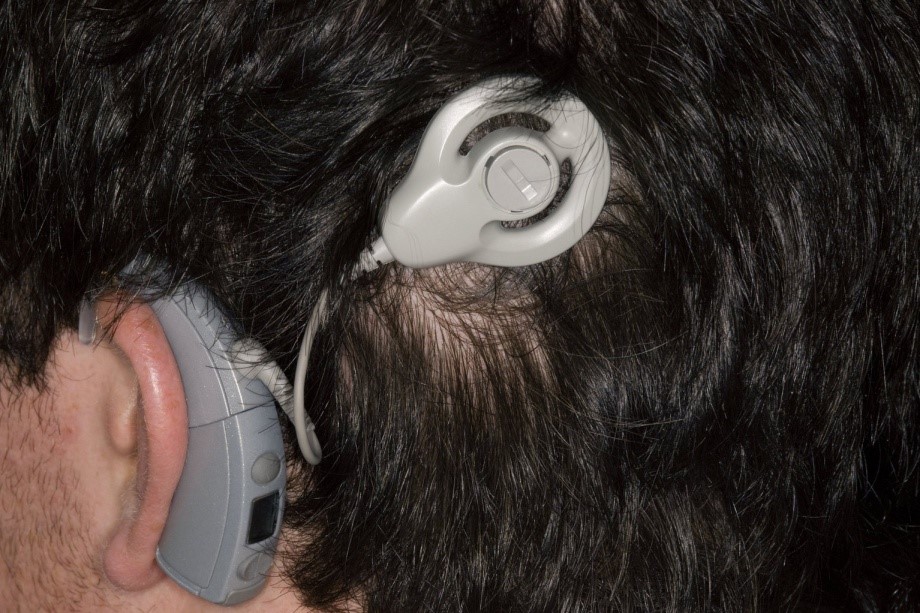
Basic Instructions for NHS Hearing Aids
Our patient guides explain the basic operation of the two types of aids issued by the NHS.
For videos on hearing aids and communication support, please see the C2Hear website
Regular Checks and Care Plans
Check for ear wax regularly – in the ear and in any Hearing Aids used.
Have a Care Plan to support Hearing Aid use, this should include records of:
- Daily – check that hearing aids are working
- Weekly – hearing aid battery change (if battery-powered)
- Yearly – yearly maintenance. Please contact Audiology to arrange.
- Every 3 years – hearing test completed.
Hearing Aids – Quick Checks – The 5 C’s
Correct – belong to the person and in the correct ear
Charged – correct batteries giving power and changed weekly or aids in powered charging station charged daily
Clean – not blocked with wax
Comfortable – fitting well, hearing well
Current – less than 5 y old and set to test less than 4 years old
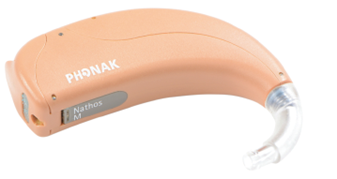
Troubleshooting
If you are experiencing issues with a hearing aid or wants some information on hearing aid care please see the NHS Hearing Aid and Troubleshooting Guide.
Hearing Aids for Residents with Dementia – Problems which may arise
Maintaining aid use can be challenging. The person with dementia may not be able to tell you what is wrong.
Common problems include lost aids. To help:
- Record in care plan (or take photo) of what type of aid used
- Named earmoulds, initials marked on aids Retention cords to attach aids to clothing
- Newer aids can be linked to smartphone app including ‘Find my Aid’ function – contact aid supplier
Rejection of aids (especially in long term users). To help:
- Check aid is working – non-working aids feel like an earplug and make communication worse
- Check aid is comfortable – it should fit without putting pressure on any part of the ear
- Check ear health – for wax or infection or skin lesions in the ear
- Aid may be too loud – all modern aids can be adjusted – please contact the supplier
- Take care inserting aids – ears are sensitive. Show aids first, touch shoulder/head area then ear, then gently insert
Tolerance of aids may change with time. Please seek advice if aids continually rejected.
Training
Please see the training page for further details
Useful Resources
General
- Multi-agency Advice COVID communication for people with sensory impairment
- RNID Communicating with People who are Deaf or have Hearing Loss: Communicating Tips
- City of Edinburgh Council Hearing Loss Support Directory (Edinburgh-focus but information on national services)
- Royal National Institute for the Deaf Guidance for supporting older people with hearing loss in care settings (including hearing aid care plan)
- NHS Lothian Ear Wax Treatment
- Social Care Institute for Excellence Dementia and Hearing Loss
Dementia and Sensory Changes:
- Life Changes Trust Dementia and Sensory Challenges
- Dementia UK Dementia and Difficulty with Sounds (booklet)
Tinnitus
Hearing aids
- C2Hear – a range of general videos on hearing use and care
- NHS Lothian Hearing Aid Care Video
- NHS Lothian Hearing Aid Troubleshooting
Assistive Technologies
Council-funded equipment provided by:
- Edinburgh, Midlothian and East Lothian – Deaf Action
- West Lothian Council – Sensory Support Service
RNID Technology Guide – A guide to the whole range of equipment available including personal listeners, TV listeners, loop systems, help for the phone, smartphone apps to provide speech-to-text and to help manage tinnitus.
Service information
The four Lothian Health and Social Care partnerships commission community-based support services for people with sensory impairments.
- Deaf Action provides specialist social work for Deaf people and an equipment service (Edinburgh, Midlothian and East Lothian).
- Sight Scotland provides a rehabilitation and mobility service for people with sight loss. (Edinburgh, Midlothian and East Lothian).
- Visibility Scotland provide emotional support, advice and tech demonstration for all patients of the Princess Alexandra Eye Pavilion, and also provide rehabilitation and habilitation services for all ages in West Lothian.
For further information
Please contact Audiology marked FAO Denise Rennex
To refer to us
Please see the Audiology referral page for more details on referral.













